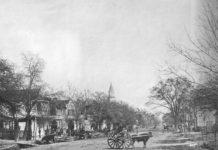Once upon a time, in the bustling colonial town of Williamsburg, Virginia, there existed a beacon of knowledge, a herald of truth, and a voice of the people—the Virginia Gazette. It stood as a testament to the power of the press and the enduring spirit of journalism.
The origins of the Virginia Gazette can be traced back to the year 1736 when William Parks, a printer from Maryland, set up his press in Williamsburg. With ink-stained hands and a heart ablaze with ambition, Parks sought to establish a newspaper that would inform, educate, and inspire the citizens of the burgeoning colony.
In those early days, the Gazette was a modest publication, its pages filled with advertisements, local news, and occasional pieces of poetry or prose. But as the colony grew and the winds of revolution began to stir, the Gazette evolved into something more—a champion of liberty and a defender of the rights of the people.
During the tumultuous years leading up to the American Revolution, the Virginia Gazette played a pivotal role in shaping public opinion and galvanizing support for the cause of independence. Its pages echoed with the fiery rhetoric of patriots and statesmen, urging colonists to resist tyranny and fight for their freedom.
One of the most famous contributors to the Gazette was none other than Thomas Jefferson, whose eloquent words found a home in its columns. His impassioned writings on liberty, democracy, and the natural rights of man struck a chord with readers far and wide, inspiring them to join the cause of liberty.
But the Gazette was not without its challenges. In 1746, it faced its first threat when the colonial government attempted to censor its content, fearing the power of the press to sway public opinion. Undeterred, Parks and his fellow printers fought back, defending the principles of free speech and press freedom.
Despite the obstacles they faced, the printers of the Virginia Gazette remained steadfast in their commitment to truth and integrity. They braved the dangers of censorship and persecution, risking life and limb to ensure that the voice of the people could be heard.
As the years passed and the nation forged its destiny, the Virginia Gazette continued to bear witness to history, chronicling the triumphs and tribulations of a young nation. It weathered the storms of war and revolution, survived the rise and fall of empires, and stood as a sentinel of democracy in an ever-changing world.
Today, the legacy of the Virginia Gazette lives on, a testament to the enduring power of the written word and the indomitable spirit of those who dare to speak truth to power. Its storied history serves as a reminder of the importance of a free and independent press in preserving liberty and democracy for generations to come.


























